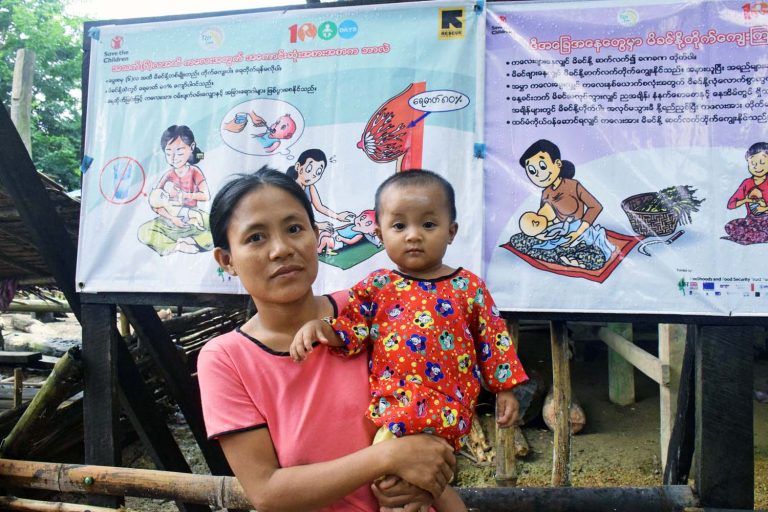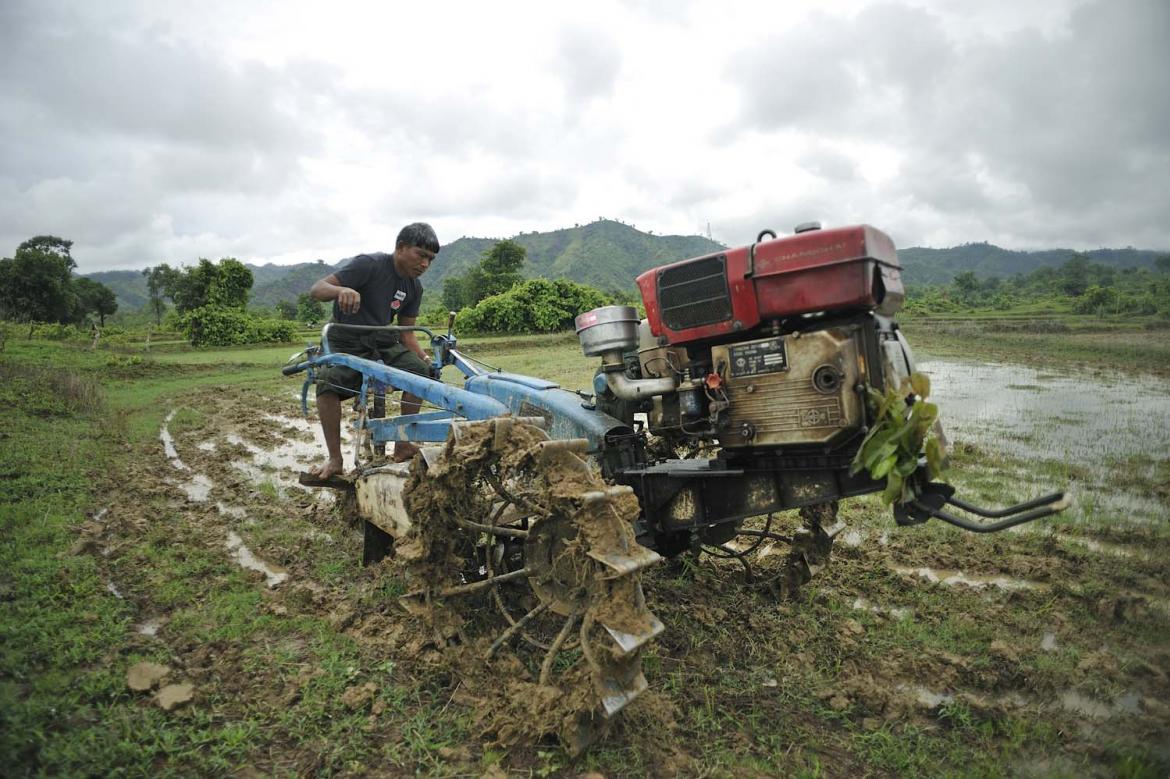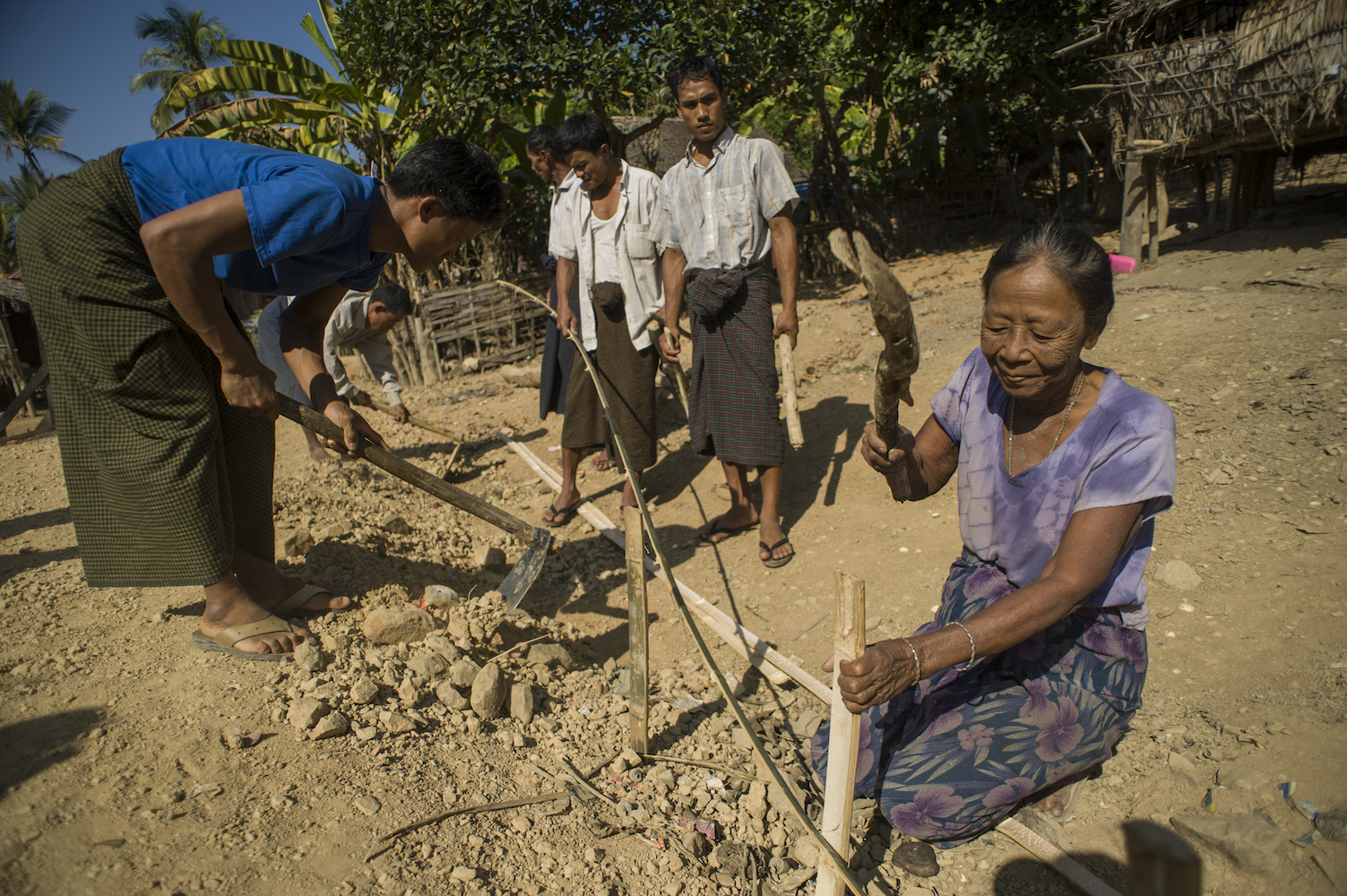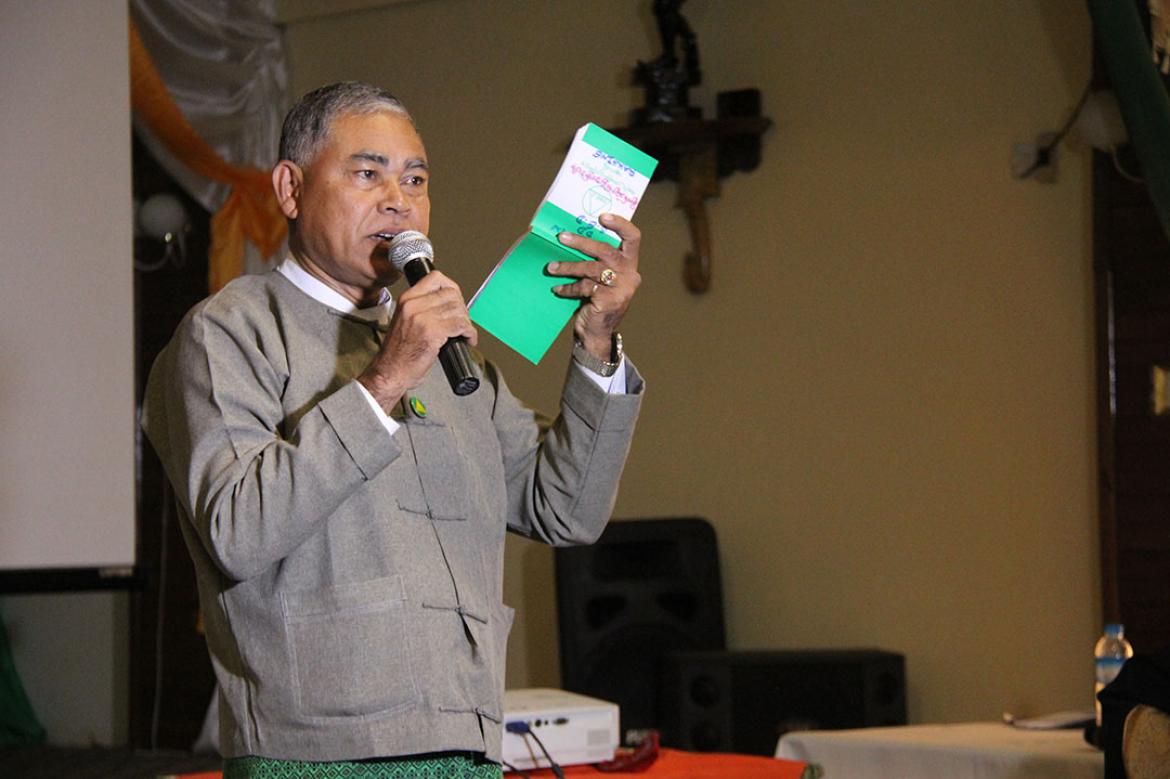This article was produced and sponsored by the Tat Lan programme.
Associations aimed at promoting savings are providing a platform for women’s empowerment and mobilisation in isolated villages in rural Rakhine State.
By MARGARITE CLAREY | TAT LAN
“Hey! Fetching water from the well isn’t just my responsibility, it’s yours too!” mimics Ma Htay Sein, a spirited 37-year-old from Cheit village in central Rakhine State’s Minbya township. In a community traditionally governed by men, Htay Sein is no longer afraid to speak up, whether at home or in public.
“Women in my community work as hard as men during the day, but still have to do the household jobs alone each evening while the men relax,” she says, drawing nods of support from the women seated on the floor beside her.
Htay Sein is the chairwoman of the Thu Ka Eain Village Saving and Loan Association in Cheit village. The 15 women gathered at the association today are discussing gender equality rather than their finances – but this shouldn’t be surprising.
Although not specifically designed for female membership, the VSLA groups set up with help from Tat Lan implementing partners Save the Children and the International Rescue Committee have proven popular among women in Rakhine, who face more barriers to accessing credit than their male counterparts.
Among the 377 VSLAs set up in Rakhine’s Myebon, Minbya, Pauktaw and Kyaukphyu townships, women outnumber men nearly seven to one: more than 8,100 women have signed up, compared to 1,200 men.
Still, when Tat Lan teams travelled out to the villages to present the VSLA model, many people they met were skeptical of the value of a saving and loan group and women – who traditionally manage family finances but are excluded from decision making – were discouraged from joining.
“When I first started saving with the VSLA in my village, I was scolded by my husband as he thought it was useless,” says Ma Khin Mar Sein from Myebon Township. She deposited the money she made from selling palm juice each fortnight without telling him. “When I told my husband, who is a paddy farmer, that I’d made K200,000 in savings and interest when the VSLA paid out our annual share, he was amazed and encouraged me to save more.”
VSLA members now take home an average of over two months’ wages in savings and interest at the end of each saving year. Reliance on high-interest loans from shopkeepers has plummeted, with 33 percent of households across 202 villages using VSLA loans instead. With less debt and more savings, families are taking these loans not to buy food but to invest in their livelihoods.

A mother and VSLA member from Pauktaw township helps her sons with their homework from her shop. Families involved in the VSLAs are increasingly investing in their children’s education. (Kaung Htet | Tat Lan)
Investing in a better life
A short walk around Bar Wai village, home to 150 families, reveals pigpens, breeding ducks, clothing stalls and grocery shops tucked under the stilts of residents’ elevated, thatched homes. The success of the associations has not gone unnoticed. When the township administrator needs donations for a community project, he invariably knocks at their door; when fishermen and crab breeders want to expand their businesses, they too turn to the VSLA for help.
“Before the VSLAs, some people bred fish and crabs, but life was more difficult. We didn’t have any money to spend on our businesses,” says 31-year Ma Khin Nan Kyi, who chairs two VSLA groups in Bar Wai village, Myebon Township. “I’ve borrowed money to help my husband buy fishing nets and we’ve agreed that I’ll sell the smaller fish in the village market and save the profit back in the VSLA.”
“Families are no longer spending savings and loans on daily expenses,” says Ko Kyaw Soe Moe, financial services manager at the International Rescue Committee. “Instead they are looking ahead and investing in ways that bring returns on their money – in agriculture, livestock, fisheries and small businesses.”
Mr Nicolas Guillaud, food security and livelihoods adviser at Save the Children, says the financial literacy training given to VSLA members and their communities has contributed to a shift in the way families spend money. Almost 14,000 adults, youth and children have participated in the training, which is geared at developing savings habits, managing debt and prioritising expenditures. “It equips communities with basic knowledge and tools to improve the way financial decisions are made,” he says.
The cohesion and trust built between members is extremely important, says Guillaud. “This mitigates the financial risks that come with borrowing, as each members’ means and needs are taken into account – a flexibility you won’t find in more formal services or microfinance models.”
Each VSLA has a social fund – an interest-free pool that members can draw in case of a family emergency – that reinforces their solidarity.

With confidence and savings from her participation in Bar Wai Village Savings and Loans association in Myebon township, 25-year old Ma Esther brought the first duck-breeding business to the village. (Tat Lan)
Empowering women
With a 98 percent loan repayment rate, the commitment to a collective cause brings financial rewards. But for the women who comprise most of the membership of VSLAs, this unity is about more than money.
“By having the VSLA group, we now have a strong network between women. We can share our problems with one another. This really helps release our stress,” says Htay Sein, the VSLA leader from Cheit village.
Ma Than Than Oo from Kan Ni in Minbya Township joined her VSLA group in 2017, using her first loan to begin trading dried fish. By her second loan, she had expanded to vegetables that were unavailable from local farms, including onions, garlic, ginger, cabbages and potatoes. Now she is considering investing in a warehouse to store and distribute produce she has transported from neighbouring Magway Region.
“I chose this business because people eat every day and always need basic groceries like onion and garlic,” she said at a Tat Lan small business training in Minbya in November 2018. “I am confident about running my business now. Because I’ve been successful, I know I can do it.”
The confidence and income she gained from running her own business have changed the dynamics within Than Than Oo’s household, where she says her husband was “always the decision maker”.
“I had to follow his instructions because he was the one making and managing our money. I felt like he looked down on me,” she says.
While the VSLA groups put women in a stronger position to mobilise their family’s financial resources, it is their involvement in collective decision making that boosts their confidence and shifts dynamics in the community, says Ms Sharon Mosin, a financial inclusion expert and former adviser to the Tat Lan VSLA programme.
“The decision making that comes with being part of a VSLA impacts members’ readiness to speak up, ask questions and deal with money,” she says. Equality is integral to the way the VSLAs function, from the election of leaders via secret ballot to dividing out the savings and loans.
“If members are not happy with the decisions made, they can say so – their voice matters as they realise that if they do not speak up, and the group dynamics are not working, everyone misses out.”

VSLA members from Kan Ni village in Minbya township laugh as they note down the savings contributions made by members during their fortnightly meeting. (Kaung Htet | Tat Lan)
Tackling gender discrimination
With the network provided by the savings group, women have also proven more likely to show up – and speak up – at community meetings. Outcome monitoring data from central Rakhine villages where Tat Lan is being implemented shows that in just six years the proportion of women who say they are involved in community decision-making processes has almost doubled, from 41 to 79 percent.
“According to culture in our community, women aren’t treated equally as men,” says Htay Sein. “Parents only let their daughters stay in school for a few years, but boys are encouraged to stay on. Even now, we earn much less than men.”
Her VSLA group is one of 28 that have signed up for Tat Lan’s weekly “Coffee and Tea” sessions during which participants are encouraged to reflect on and mobilise around gender discrimination and violence. Introduced in Myebon and Minbya in 2018 based on a six-month curriculum, the sessions have been readily accepted in villages with VSLA groups due to the cohesion and trust already built between female members.
“The women are more open to sharing and discussing their experiences with one another,” says Ma Htike Htike Ngu Kyi, women’s protection and empowerment manager for Tat Lan in Myebon. “Because they have a stronger attachment it has been easier for us to raise traditionally taboo topics, like violence in their homes.”
To complement the sessions, VSLA members and others from their communities were invited to a legal training in Myebon in November, led by Legal Clinic Myanmar (LCM). The organisation, which specialises in improving access to justice for women and children, worked with the villagers to build up their understanding of existing laws, services and procedures related to women’s protection and gender-based violence.
Ma Hla Hla Yee, director of LCM, says development activities geared toward women’s empowerment should be combined with efforts to improve knowledge of legal rights.
“Some communities find it very difficult to accept gender equality because of dominant rural practices and norms,” she says. “But, when you come from a legal stance and explain that gender-based discrimination and violence is prohibited by the law, then people listen.”
Among those who attended the legal training in Myebon in November was Ma Tin, a mother of five and VSLA leader. “I knew that our country has laws, but I didn’t know who to speak to, or what to say,” she says.
“Now that women in our village have knowledge about their rights, they have started to raise their voices,” echoes Htay Sein. “But it’s hard to change people’s mindset around equality.”
Building a better future, together
Despite these gender barriers, the members of Cheit village’s VSLA group are carving out a role for themselves in the development of their community.
For over a year, the village had been unable to hold preschool classes because heavy wind and rain had badly damaged the school building.
VSLA members decided to take matters into their own hands and created a school fund with one-off contributions from each member. To grow the fund they lent the money back to VSLA members with interest. Once they had enough money set aside, they proposed to the Village Development Committee (VDC) that they work together to rebuild the preschool and formed a committee to oversee construction work.
“We built the foundations together,” says Htay Sein. “The men dug the holes while we carried the wooden pillars.”
Twenty children have enrolled at the new preschool and the VSLA members continue to use their school fund to cover the salary of two teachers – an accomplishment that the group takes great pride in.
“We are strong because we are united. With the VSLA we have a reason to come together. Now, we can influence the men and help our community,” says Htay Sein.
Among the women taking strides in running businesses and leading their families out of poverty, Than Than Oo is resolute. “Now we know that we women have to stand up and speak out if we want to improve our lives.”
The VSLA model
With over 17 million active participants across 75 countries, the VSLA model is a grassroots banking system tailored towards providing the rural poor with a safe and affordable means to save money and access loans. Unlike formal financial institutions, a VSLA requires neither capital nor collateral to get started – just a lockbox, three keys and some basic financial training. After electing a chairperson and accountant, agreeing on a savings or share price and the conditions for low-interest loans, the members meet each fortnight. At the end of the one-year cycle, members of the group – not lenders or an institution – pocket the interest they’ve earned through loans.
When the Tat Lan VSLA programme launched in 221 rural villages in central Rakhine State in 2013, only four percent of families had set aside any annual savings. Most households were living off just K74,000 a month and needed to take loans to cover their meals. With shopkeepers and money lenders charging interest as high as 25 percent a month, few could afford to take on further debt to invest in their livelihoods or small businesses.







